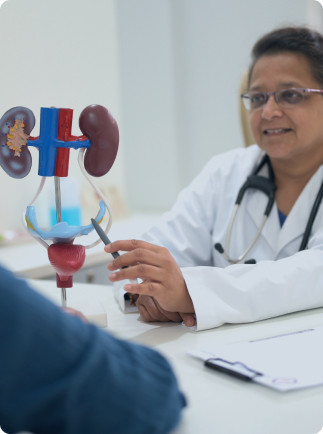Gynaecology
- Home
- /
- Gynaecology

Gynaecology Department
At Amba Health Centre & Hospital, we understand that women's health is a delicate and important aspect of their overall well-being. Our Gynaecology Department is dedicated to providing comprehensive and compassionate care to women of all ages, addressing a wide range of gynaecologic issues, from preventive care to complex medical and surgical treatments.
At Amba Health Centre & Hospital, we strive to provide accessible and high-quality gynaecology services to all women, regardless of their economic background.
Your well-being is our top priority, and we are committed to supporting you at every stage of your life.
Our Services
Comprehensive Women's Health Exams
We offer annual preventive women exams to monitor and maintain your health, providing you with personalized care and guidance.
Menopausal Health
As women transition through menopause, we provide specialized care to manage symptoms and promote overall well-being during this phase.
Gynaecologic Oncology
For women facing gynaecologic cancers, we have a specialized team capable of diagnosing and treating various gynaecologic cancers, providing you with comprehensive cancer care.
Urogynaecology
Our team of experts can address urinary incontinence, pelvic prolapse, and other urogynaecologic problems, offering both conservative and surgical treatment options.
Specific Treatment for
- Irregular Periods: We can evaluate and manage irregular menstrual cycles to identify the underlying causes and provide suitable treatments.
- Heavy Periods (Menorrhagia): Our team can address excessive menstrual bleeding, helping you find relief and improve your quality of life.
- Painful Periods (Dysmenorrhoea): We offer solutions to manage and alleviate menstrual pain, ensuring your comfort during this time.
- Pre-Menstrual Syndrome: If you experience troublesome pre-menstrual symptoms, we can help manage and alleviate them.
- Vaginal Discharge: We can diagnose and treat abnormal vaginal discharge, promoting vaginal health.
- Chronic Pelvic Pain: Our experts can investigate the causes of chronic pelvic pain and provide appropriate management strategies.
- Pelvic Inflammatory Disease (PID): We offer diagnosis and treatment for PID, helping you recover and prevent complications.
- Breast Pain/Lump/Discharge: Our team can evaluate and manage breast-related concerns, providing support and guidance as needed.
- Perimenopausal and Menopausal Problems: We provide care and support for women navigating perimenopause and menopause, addressing associated symptoms and concerns.
Gynaecology Procedures
- Pap Smear: Regular Pap smears are crucial for cervical cancer screening, and we offer this preventive procedure.
- Intrauterine Contraceptive Device (IUCD) Removal & Insertion: Our experts can provide IUCD insertion and removal for effective contraception.
- Endometrial Biopsy: If required, we can perform an endometrial biopsy to investigate certain gynaecologic conditions.
- Breast Examination: Routine breast examinations are essential for early detection of abnormalities, and we provide comprehensive breast exams.
- Menstrual Hygiene Awareness: We believe in educating women about menstrual hygiene practices for better health.
Gynaecology Surgeries
- Our team of skilled gynaecologic surgeons can perform a variety of procedures to address various conditions. These include:
- Dilatation and Curettage (D&C): A procedure used to diagnose and treat certain gynaecologic conditions.
- Hysterectomy (Abdominal/Vaginal): Surgical removal of the uterus, depending on the patient's specific needs.
- Total Laparoscopic Hysterectomy (TLH): Minimally invasive removal of the uterus using laparoscopic techniques.
- Laparoscopically - Assisted Vaginal Hysterectomy: A combination of laparoscopy and vaginal surgery for certain cases.
- Non-descent Vaginal Hysterectomy: A vaginal hysterectomy technique for specific conditions.
- Anterior and Posterior Repair (Colporrhaphy): Surgical repair of the vaginal walls to address prolapse.
- Myomectomy (Open/Laparoscopic): Surgical removal of uterine fibroids while preserving the uterus.
- Salpingectomy: Surgical removal of one or both fallopian tubes.
- Oophorectomy: Surgical removal of one or both ovaries.
- Ovarian Cystectomy: Surgical removal of ovarian cysts while preserving the ovaries.
- Radical Vulvectomy: Surgical treatment for vulvar cancer in advanced cases.
- Wertheim’s Hysterectomy: A specialized type of hysterectomy for specific gynaecologic conditions.
- Diagnostic Hysteroscopy: A minimally invasive procedure to examine the uterine cavity.
- Therapeutic Hysteroscopy: A procedure used to treat certain gynaecologic conditions.
- Surgery for Endometriosis: Surgical interventions to manage endometriosis.
- Sacral Suspension Surgeries for Uterine & Vault Prolapse: Surgical techniques for addressing pelvic organ prolapse.
- Adhesiolysis: A procedure to remove adhesions that can cause pain or infertility.
- Transobturator Tension-free Vaginal Tape (TOT/TVT) Sling for Stress Urinary Incontinence: A minimally invasive procedure to address stress urinary incontinence.
- Loop Electrosurgical Excision Procedure (LEEP): A procedure to remove abnormal cervical tissue.
- Cervical Polyp Removal: Surgical removal of cervical polyps.
- Management of Uterine Polyps: Treatment for uterine polyps.
- Bartholin Cyst/Abscess Treatment: Surgical intervention for Bartholin gland issues.
- Gynaecologic Reconstructive Surgery: Reconstructive surgeries for gynaecologic conditions.
- Pelvic Floor Reconstruction: Surgical repair of pelvic floor issues.
Doctors for Gynaecology
.png)
Dr. Mohil D. Patel
Onco Laproscopic Surgeon
Qualification
MBBS, DGO, FMAS

Dr. Priyanka Virani
Obstetrician and Gynecologist, Laparoscopy Surgeon
Qualification
MBBS, DGO, MRCOG, FMAS
FAQ
Women often seek medical attention for conditions like irregular periods, pelvic pain, vaginal infections, and menstrual irregularities.
The recommended age to start getting regular Pap smears is usually around 21 years or within three years of becoming sexually active, whichever comes first.
Menopause symptoms can be managed through lifestyle changes, hormone replacement therapy, and medications prescribed by a gynaecologist.
Risk factors for gynaecologic cancers may include family history, age, and certain lifestyle factors. Common symptoms include abnormal bleeding, pelvic pain, and unexplained weight loss.
Regular breast self-examinations are recommended monthly, and mammograms are typically advised every one to two years after the age of 40 or earlier based on individual risk factors.
Yes, non-surgical treatments like pelvic floor exercises, lifestyle changes, and certain medications can help manage urinary incontinence.
During your first gynaecological examination, your doctor will discuss your medical history, perform a physical exam, and may conduct screenings or tests based on your needs.
Book an Appoinment
Thank you for your connecting us for appointment. We value your concern and we will revert back shortly to confirm your appointment details.


